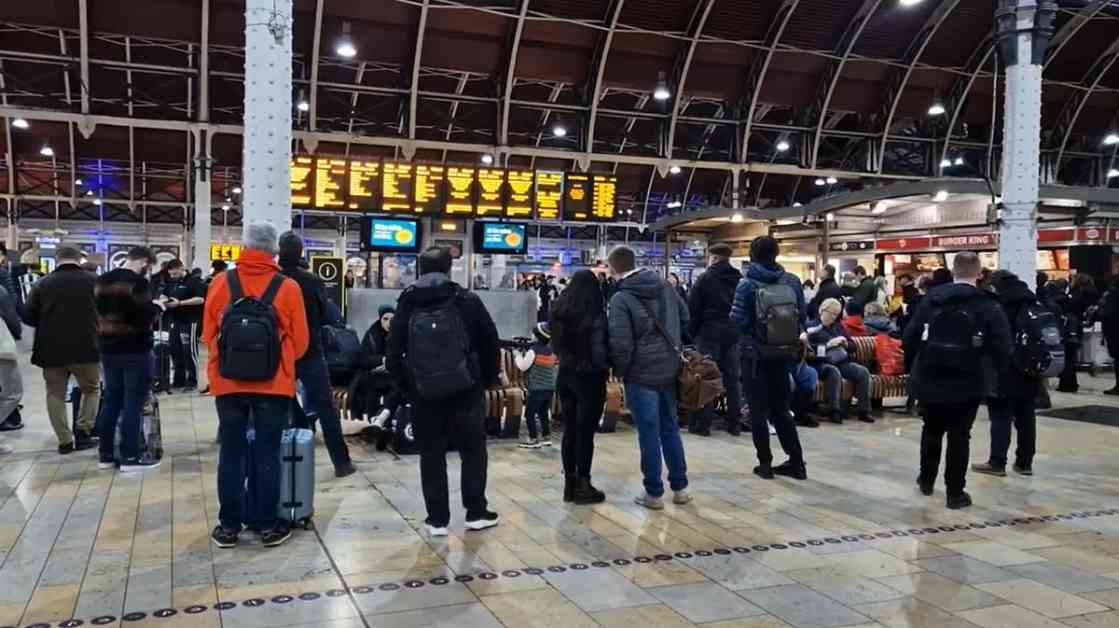Arrest made in ‘Islamophobic cyberattack’ on railway station wifi
A man has been arrested in connection with an Islamophobic cyberattack that targeted the free wifi services at several major railway stations across the country. Passengers were shocked to see a hateful message flash on their screens when trying to access the internet at stations such as Manchester Piccadilly, Birmingham New Street, Edinburgh Waverley, and Glasgow Central.
The suspect, identified as an employee of Global Reach Technology, a company that provides wifi services to Network Rail, has been taken into custody on suspicion of offenses under the Computer Misuse Act 1990 and the Malicious Communications Act 1988. British Transport Police assured the public that no personal data was compromised during the cyberattack.
Response and Investigation
Upon discovering the offensive content on the wifi networks, authorities swiftly took the systems offline and launched an investigation. British Transport Police received reports of the incident and immediately began working with Network Rail to determine the source of the Islamophobic messaging. The goal was to address the cybersecurity breach promptly and ensure the safety and security of passengers using the railway stations.
Network Rail, responsible for the management of tracks and stations, reassured the public that no personal data had been impacted by the hack. They stated that once final security checks were completed, the wifi service would be restored for passengers to use without any concerns. Telent, the third-party firm that provides wifi services for Network Rail, also joined the investigation to identify the perpetrators and prevent future cyberattacks.
Impact and Consequences
The cyberattack not only disrupted the normal operations of the affected railway stations but also raised concerns about the vulnerability of public wifi networks to malicious activities. Passengers were left shocked and disturbed by the Islamophobic message that appeared on their screens, prompting authorities to take swift action to address the situation. The incident highlighted the importance of robust cybersecurity measures to protect critical infrastructure and prevent such hate-driven attacks in the future.
The affected stations, including Birmingham New Street, Bristol Temple Meads, Leeds, and London King’s Cross, faced disruptions as a result of the cyberattack. Passengers were inconvenienced by the temporary shutdown of the wifi services, emphasizing the need for increased vigilance and security protocols to safeguard public networks from similar incidents.
Collaboration and Resolution
In response to the cyberattack, British Transport Police, Network Rail, and Telent collaborated closely to investigate the breach and implement necessary security measures. The joint efforts of law enforcement agencies and technology providers were instrumental in identifying the suspect and preventing further damage to the wifi networks. By working together, they demonstrated a commitment to ensuring the safety and integrity of public infrastructure in the face of cyber threats.
As the investigation continues, authorities are focused on restoring the affected wifi services and enhancing security protocols to prevent future cyberattacks. Passengers can expect improved safeguards and monitoring systems to protect them from potential breaches and ensure a safe and secure environment at railway stations nationwide. The incident served as a wake-up call for the transportation industry to prioritize cybersecurity and proactively address threats to critical digital infrastructure.
The arrest made in connection with the Islamophobic cyberattack on railway station wifi sends a strong message that hate-driven actions will not be tolerated and that perpetrators will be held accountable for their offenses. It also underscores the importance of ongoing vigilance and collaboration among stakeholders to safeguard public networks and protect passengers from malicious activities. By addressing the root causes of such cyberattacks and implementing robust security measures, authorities can create a safer and more secure environment for all individuals utilizing public wifi services at railway stations.












